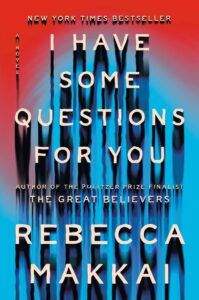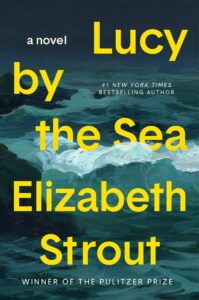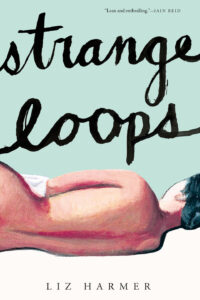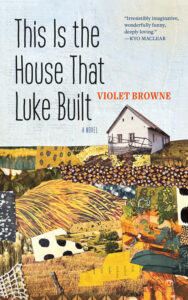March 17, 2023
I Have Some Questions for You, by Rebecca Makkai
There were some moments in which I felt, reading I Have Some Questions for You, that perhaps Rebcca Makkai was trying to squeeze too much into this book. A novel 400+ pages long, a campus novel, murder mystery, #MeToo/cancel culture moral reckoning, Anti-Black racism and how the justice system is far from just for people of colour. Plus a treatise on true crime podcasts, because Mekkai’s narrator Bodie Kane is a podcaster too, in addition to being a film professor, and she casually rattles off old crime cases: “Wasn’t it the one where she was stabbed in—no. The one where she got in a cab with—different girl. There one where she went to the frat party, the one where he used a stick, the one where he used a hammer…” A story that’s specific and unspecific at once, positively amorpheous.
The specific part of the story is about Bodie returning to the scene of the crime in 2018, which is to say high school, which was, in her case, a mid-grade New Hampshire boarding school she’d been sent to in the 1990s by a benefactor after horrific tragedy had befallen her family in Indiana. Those years were, as high school always is, complicated, Bodie conscious of herself as an outsider, and then, in her senior year, her roommate from the year before is murdered. The school’s athletic assistant was found guilty, and he also happened to be one of the few Black people on campus. By 2018 and deeply steeped in true crime podcasts, Bodie is already mildly obsessed the case as she comes back to Granby to teach seminars on podcasting and film history.
At the same time, her husband (they’re separated; he lives next door/ they get along fine) is being cancelled on Twitter by a somewhat insufferable performance artist, and Bodie is slowly being undone by the complexity of these matters: what is the distance between what her ex is alleged to have done and other instances the prompted us all to #BelieveWomen, plus the absolute bullshit she and her peers had to put up with with in high school from male teachers, and even from each other as rumours spread (but then some of these rumours are what protected students from abusers—how do you ever know what/which women to believe?).
It’s been a busy week and I’ve not had as much time to read this book as I would have liked, to give it the focus it really deserved, so that I could get lost in it, but last night I sat down for a couple of hours to finish it and finally everything clicked, the over-stuffedness, the real answer to whodunnit:
“My point is, you were part of the machine… You drove the getaway car. You threw bricks through the window and someone else grabbed the jewelry. You distracted the feds while the spies got away You held her down while someone else beat her. You shot the deer and wounded it; when the second hunter came along, the deer could no longer run.”
What a marvelous, absorbing, complicated world of a book this is, a literary mystery, and a mirror.
March 15, 2023
Mitzi Bytes Turns 6!
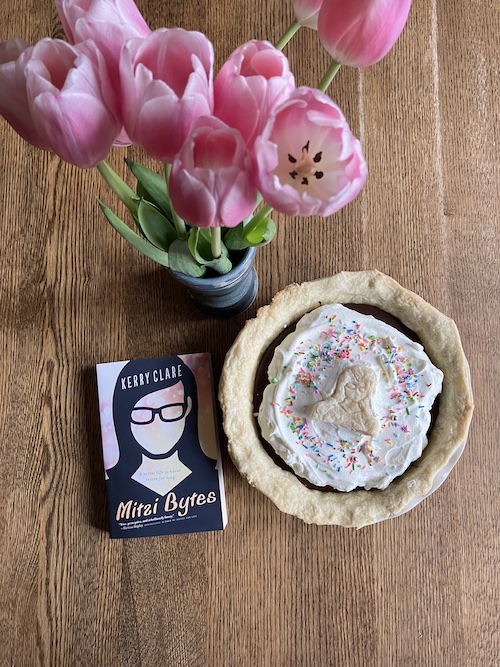
It’s March Break this week (low key staycation edition) and yesterday we celebrated Pi Day AND the sixth birthday of my very first novel with a chocolate pudding cake. It’s especially exciting to be celebrating this milestone as I’m hatching plans to bring my THIRD novel into the world on September 5. (Cover reveal is coming next week!! Stay tuned!).
March 14, 2023
Gleanings

- I’m amazed at how grateful people are for doing such a small and frankly entirely selfish thing – I wanted company and put the word out.
- One of the things I’ve missed the most during our COVID isolation is the kitchen conversations with my friends — each one of them kind, loving, loyal, inquisitive, adventurous, and smart as all get-out! We’d gather around the island, plug in the kettle, warm the pot, grab the cups, milk, spoons and biccies and settle in for an afternoon of solving the world’s problems. Or at least taking a stab at solving our own.
- But I think the desire to create is more than that, more than just a legacy. It’s different parts of yourself coming together – your experience, your talent, your learning, your emotions, your thoughts, your imagination – in one expression. With your creation you say: this is a glimpse of who I am. It satisfies a piece of your soul.
- it feels like such a gift to witness others in their everyday ordinary extra-ordinarines. sometimes i feel like I’m intruding, like I’m gawking, peeking through a window into someone else’s world …
- I have been off work the past two days—well today is the second day—because I’ve not been feeling well, and while I probably could have gone in today, I’m glad I didn’t. I am learning, finally, at the ripe old age of 56, to allow myself the opportunity to slow down when I need to.
- So a title first and then a decision about what to do with the manuscript. I don’t have forever. None of us do. So I’ve become quite purposeful about tying up threads.
- The story is thin, but at that time I was still figuring out a lot about writing myself. I still am. I also didn’t know how serious R was. Next time–if there’s a next time–I’ll write a better story. And I’ll revise it before I give it to R.
March 9, 2023
Ordinary

A year ago, my mental health was terrible—a sentence that will be evergreen for me until the end of June—but early March was a particular low point, my anxiety ramped up again and me still so far from understanding how it played such a dominant role in my mindset and how much of my worldview was informed by a catastrophic thinking I’d just accepted as normal. I remember one of our first dinners out in a restaurant and not being able to enjoy it at all, because I spent the entire meal quite sure that we were all going to die quite shortly, and it was almost a little bit fascinating to look around me and see how everybody else was just taking it on the chin.
It was not a good time. And yet, there was sweetness. We were moving through March and the first one in three years that didn’t come with absolute dread. When my children brought their indoor shoes home for March Break, it wasn’t because I wasn’t sure they wouldn’t see the inside of a school again until September. We were eagerly anticipating our long awaiting trip to England, but Covid was also still surging, the idea of travelling was stressing me out, and I wasn’t sure that every March until the end of time would not take the shape of a spiral toward doom. I was incredibly moved last year to have our first ordinary March Break in such a long time, and so have my kids return to class as normal afterwards—but it also still felt precarious. Those convoy people had broken my soul. It felt so good for things to finally be okay again, but I still felt so far from okay.
And then this morning, 365 days from then. Another day of sunshine and blue skies, and there is this way the sunbeams appear in my kitchen around 8:30 in the morning from the southeast, making their way around my neighbour’s house and onto the counter, my cupboards, so golden, and my children were happy. We were putting lunches in their backpacks. They’ve stopped wearing masks to school. Iris had a school trip to the art gallery yesterday. Harriet’s school had an open house today so we could visit and see the zoo exhibits she and her classmates had built. Yesterday I had a meeting with my publishing team to hatch plans for my upcoming book. I spent the afternoon in a cafe finishing edits and eavesdropping on idiots, and then attended an event for International Women’s Day with wine and cheese, the first event held in the PRH office since March 4, 2020, back when everyone was wiping down surfaces out of an abundance of caution.
And this. The sun. This week. Today. In the deepest pit of pandemic despair, this ordinariness was everything I longed for, everything I missed to my very marrow. Backpacks, and laughter, and learning, and growing, and walking the route to school that I’ve been walking now for a decade. Things to look forward to. Moments to steep in. I am so so grateful, and so very happy, and tomorrow’s the last day of school before March Break and it feels like, instead of being stuck or in a spiral, we’re marching forward, forging new paths. Finally, finally. What a long, long road it’s been.
March 7, 2023
Gleanings
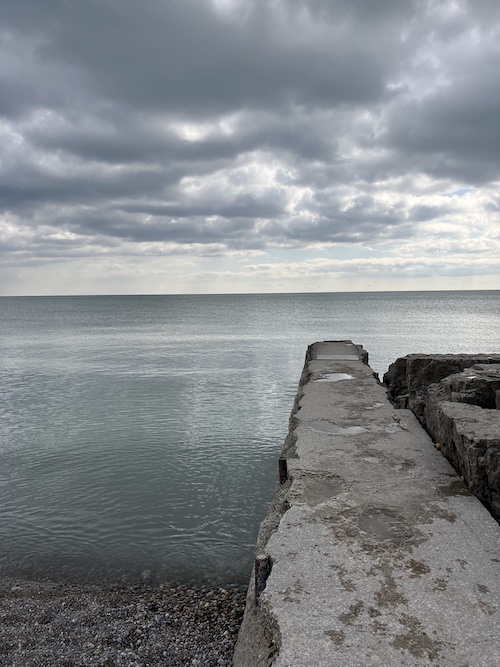
- high need for closure.
- What’s courageous about the timeless combination of broccoli and pasta, Deb? It’s the cooking time. This broccoli is not al dente. It does not “retain a crunch,” “still have some bite to it,” or keep any of the verdant green hue it entered the pan with. And, even more audacious, it doesn’t wish to.
- May we follow his example and make our dreams come to fruition. So,we may not be tempted in the least to ride a bicycle and camp across the United States, but I bet there’s something for each of us. What’s calling you?
- Mark was very startled by the phrase “that’s a good-looking dog” when I first pointed one out on the sidewalk, but now he uses it too–it originated with my father.
- Like I said, I wasn’t asking for its input. I don’t need my phone to tell me how much I’ve walked or haven’t walked. Does my phone know that the sidewalks have been icy, the winds bitter and blustery? It should! It seems to know everything else.
- It’s more important to make good art than to garner a lot of attention on social media.
- simply because I want to cherish the sweetness (and ache) of this very fleeting now in which we travel with stuffed bunnies.
- We don’t know at the time that these ordinary moments will one day resonate in the way that they do. And that, in part, is what makes them so extraordinary.
- Just in general, it’s been valuable to challenge my preconceived ideas about the environment in which I work. It’s probably premature to use the term “post-pandemic,” but as spring 2023 approaches, I have a sense that many of us–individually and in groups–are looking around and within to see how our work in the world has changed in the past three years and what the future could hold.
March 6, 2023
Rereading Lucy Barton
This is a post about a lot of things. It’s about being wrong, and dismissing certain ideas and ways of being, and the question of how one knows what’s good, all of which are actually themes of Elizabeth Strout’s Lucy Barton books, which begins with My Name is Lucy Barton, and continues with the story collection Anything is Possible, Oh, William, and, finally, Lucy By the Sea.
I first read My Name is Lucy Barton in 2016 and, if you’ll recall, I did not like it. I wrote, “I bought the book in hardback, paid $30+ for it and felt I’d paid a lot of money for something slight and unfinished. Which was inherent to the project, I supposed, but I was never able to quite figure out how, or what the point was, or why this wasn’t a novel proper.” At the time, I’d also noted that the book was short enough, however, that maybe I’d go back and read it again…but I didn’t. Even with the subsequent books, I was willing to let Lucy Barton go. But then the books started to be awfully celebrated, appearing on book lists, readers I admire a great deal declaring their love for them, and so this winter I decided to try them again. (No big chore either, they’re all very short!)
And I’ve got to tell you that everything I thought was weird and slight about the Lucy Barton novels is still right there. The downright unfashionableness of the project too, the quiet, the earnestnes, so many exclamation marks!! (!!). Telling, not showing. She’s breaking all the rules I know of how to write a novel well, and it’s my immediate instinct to dismiss these books again. I’m only considering them again because other people are telling me that they’re good, instead of me knowing that in my bones. And isn’t that everything we’re advised against as readers, as critics, as humans? Of following the crowd, reading like sheep?
I fervently believe that so much of what we regard as literary criticism is actually a matter of taste, and I also know that it takes all sorts, and books would be very boring if there were only one kind of book. Other people love books I loathe, and vice versa, and that’s precisely what gives books, and life, and the world, its flavour.
But still, to remain open. This is the object, I think. To stay curious. To look backwards and wonder if there is something you might have missed, some part of the puzzle you might have failed to understand.
What I missed about the Lucy Barton books in the first place is that I don’t think Strout was trying to write the novel as I know it anyway. (Similarly in her celebrated Olive Kitteridge, which was less a collection of linked stories [though it was also that] than an attempt to show the multitudinous of humanity and the universe, and the fundamental unknowability of another human being.) Strout’s books are less an exercise in narrative than one of character, and its variable layers, and the connections between them, and between places, ideas, and things,
Such as that Bob Burgess, who Lucy Barton meets Lucy By the Sea, has his own book, Strout’s 2013 novel The Burgess Boys, which I’ve just put on hold at the library. Or that Olive Kitteridge herself shows up, secondhand, in Lucy By the Sea, in conversations Lucy has with the cleaner from Olive’s apartment building. Or even just the way that one paragraph leads to another, leaping back and forth across time, between focusses and ideas, almost a randomness to their pattern—which had been my impression when I first read My Name is… back in 2016. When I hadn’t known enough to trust that I was in the literary hands of somebody I could trust.
“One of the reasons I believe this memory to be true is, first of all, it was so strange.” —Lucy by the Sea
It is the strangeness, and seeming randomness, of the Lucy Barton books that has me having real difficulty understanding it as fiction, has me struggling to believe that it is not true. Because the strangeness is so lifelike, as opposed to the constructedness of a literary narrative, the sense that a fictional world has to make, or so I assume—and Elizabeth Strout does no such thing.
I had a hard time with with Lucy by the Sea, a novel beginning in March 2020 and set against the unfolding pandemic, which is to say that it got into my head and tapped into my own pandemic (small t) trauma in such a visceral way. I also loved it and found it riveting, because any work of art that can so effectively tap into one’s nervous system is a wondrous thing, but it was upsetting to live that story again, to recall the fear and uncertainty, how dire things were, which is easy to forget now that we’re so much farther down the road.
It’s a novel (like all the others, and Olive too) about relatability, about what happens when we think we know when we don’t, about the limits (maybe?) of understanding people whose life experiences have been different from our own. Or about the ways that knowing and being known can be a burden—Lucy’s relationship to her sister, or even her own daughters, who—she realizes—remain at a remove from her because their own sadness affects her too much.
Books like the Lucy Barton books are never finished, there is no THE END. As Lauren Leblanc writes, “Like in any relationship, there are times in reading these books when certain stories demand attention, and there are times when personal moments are concealed or suppressed. There is inherent pleasure in that mystery. Her books read like familiar friends: complicated, timeless, achingly human, and compassionate.”
Elizabeth Strout doesn’t write novels so much as chart constellations, connecting points of light, moments of grace.
February 28, 2023
Strange Loops, by Liz Harmer
Exquisite and propulsive are the first two words that spring to mind when I think about Liz Harmer’s latest novel, Strange Loops, which I read this weekend and found virtually unputdownable. It’s the story of Francine, a high school teacher involved in an inappropriate relationship with a former student, who is now 18, the power dynamics at play inversely reminiscent of a relationship Francine had during her own teen years with a charismatic pastor at the church Francine’s twin brother Philip had started attending, a church that Francine had followed him to, though she was never the believer that he was, perhaps the reason he’s been angry at her for decades.
The novel moves between three timelines with Philip and Francine’s respective points of view: high school era, present day when both are married with children in their thirties, and a cataclysmic family vacation five years before that during which a storm blew in and everything the twins had been repressing for decades finally exploded to the surface. Are the “strange loops” the two are caught in destined to repeat forever? Does Philip know about Francine’s relationship with her former student? Will he tell her husband? And how does their mother’s own history factor into all this, a small but essential question whose answer is vital to this novel’s tremendous power?
Last summer a Canadian journalist published a misguided memoir that became more than a bit notorious after the fact, a strange and unthoughtful work of revenge, the kind of memoir one might more often encounter in torrid fiction than real life, a book that was mostly remarkable for the questions it posed instead of any of the conclusions it came to. And if that strange memoir had been an excellent novel, it could have been this one, an unsettling story of doubleness, the messiness and irresolvability of power dynamics, and what it means to be a woman who wants, who desires.
February 27, 2023
On Conflict

Unless you’re someone who spends a lot of time on Twitter (and I’m sorry if this is indeed the case), Pamela Paul’s recent New York Times op-ed “In Defence of JK Rowling” might at first glance appear innocuous, even obvious. And because I’m now (blessedly) someone who doesn’t spend a lot of time on Twitter either, I don’t even find the op-ed remarkable. Nothing to see here, move along, which was what I was in the midst of doing when I listened to Amanda Ripley on the On Being podcast, which I found so deeply clarifying.
Now I’ve got to tell you that Pamela Paul has disappointed me. Former New York Times Book Review editor, and author of the bookish memoir My Life With Bob, which I loved and which actually changed my life, I’d sort of assumed that anybody so connected with books and reading would be far more interested and curious about the world in her columns than the Paul has proven herself to be, with hot takes such as, “Why Don’t Diversity Champions Champion Prime Minister Liz Truss’s Diverse Cabinet?”
Yawn.
(This may be the closest I’ve ever come to being one of those women who furiously post UNFOLLOWING when, say, for example, Reese Witherspoon posts a flattering profile of Michelle Obama.)
Paul’s schtick mainly seems to be appearing very reasonable while highlighting everything that’s silly/annoying/nonsensical/frustrating about identity politics, and while there’s a whole lot of material there to work with there, for sure, I’m bothered by the way that doing so plays right into the hands of right wing trolls, and is categorically programmed to generate outrage, to be click-bait. And I’m sure it’s not merely happenstance that the entire occasion for Paul’s JK Rowling piece is a podcast produced by the media company founded by one Bari Weiss, the OG schickster, who has made highlighting everything that’s silly/annoying/nonsensical/frustrating about identity politics into a lucrative career, playing the victim while railing against others who are supposedly doing the very same.
What I loved about Amanda Ripley’s conversation with Krista Tippett on On Being was how it helped me understand what exactly it is about the Weiss’s and Pauls of our mediasphere that bothers me so much, why I find their posture of reasonableness so disingenuous and counterproductive.
There is no growth, no movement, no curiosity, no desire for understanding. Instead the same old arguments, treads digging deeper, over and over, and over and over, and even worse—it’s monetized, and stoking people’s fears and contempt for their neighbours. I don’t care where you lie on the political spectrum, or how reasonable you purport to be—that’s dangerous, and I hate that, and it’s also just profoundly uninteresting.
February 23, 2023
This is the House That Luke Built, by Violet Browne
I don’t really know where to start with this book, this brutal, gorgeous, funny, strange and loving story of loss and living, though there is an obvious comparison in terms with subject matter with Lisa Moore’s February, but Violet Browne’s This is the House That Luke Built—fiction born of the author’s own experience—is something altogether its own. Something that, I must confess, I don’t *get* in its entirety, but I’m going to speculate that this is the point, that there are element of Rose’s experience of loss and widowhood that are unfathomable to me, the same way that, I suppose, I once read Rachel Cusk’s A Life’s Work before I’d had children and missed the point altogether.
The novel is told in a series of vignettes moving back and forth through time, showing Rose early in her relationship with Luke as, with her two children and his son, they come together and make a family, baby Emily arriving not long after. We see Emily in 2013: “Every since her father vanished when she was fifty-three days old, Emily’s body has been gripped by a vibration at the molecular level,” an urgency she tries to satiate with tattoos, piercings, as she tries to settle with what was lost to her. 1994, as Luke’s boat goes down in a storm. 1980 with Rose in her father’s boat as a child, in Plancentia, NL.
Mostly though, these vignettes tell the story of Rose trying (and often failing) to pick up the pieces of her family life after Luke’s death, how time marches on, how her parents and her sister keep her going, as do her children, with their own needs and particular wounds that become clearer over time. But she ends up eking out some kind of a deal with the fates, that every year on the anniversary of Luke’s death, Rose gets to walk through the wall of the house he’d built for their family and find him waiting there for her, though it’s a deal she must pay dearly for—in exchange, she’s aging faster, losing years of her life, her teeth decaying, her skin losing its definition. Until eventually she’s asked for too much…
I love this book, just as heartbreaking as it is hilarious, full of gorgeous prose, and gutsy women, and so much love, even in the face of so much loss, maybe especially. Rose’s struggles to raise her kids and make a better life for herself are harrowing and awesome, and the flame that continues to burn for the husband she lost is sustaining, transformative, unforgettable.
February 22, 2023
Gleanings

- I loved this book because it acknowledges the unfairness of the world and the privilege of those who fall back on a shallow understanding of faith. But where I can get mired in despair over these truths, Vanessa is out there beating a path through these weeds for all of us.
- The story was titled Wankus Interruptus, and when I first read those words, centred at the top of the page, I paused. (Do you know this feeling? A fleeting fuzz of nostalgia. A whiff of emotion. In this case, the top note was humour.) The phrase was familiar. Why? And in the next second I recalled.
- If you pay attention to the world, you will love it more than you realized was possible. This love will break you down and build you up.
- When we walked the route to church or our cousins’ house, we passed by the slum where our ayah lived. There was a big gate that separated the area where the servants lived in cramped poverty. Sometimes the gate was open and I would glance in as we walked by, curious about the squalor that lay beyond, where there were children like me but not like me. We were worlds apart.
- Like maybe, even if we aren’t friends (yet!), we are neighbours in a spiritual suburb full of women trying to parent and work and be full human beings and sleep through the night. It’s not a bad place to live.
- That there’s still a piece of me (oh how it works so hard to keep me safe) … that thinks that there is a right and wrong way to get to that place, that there’s a right and wrong way for me to be, to feel, to act, to travel, look, to parent, to human, to live.
- And by the time I’ve done all these things to my outer self, my inner being is nodding and rolling their eyes and going: Yeah, yeah, ok. We’re not such a dirt grub. We clean up nicely, we make cool things, we’re strong, we really do like ourselves and others. Sure. Whatever. Let’s do this.
- I sewed and John healed and then I wrote about how the two processes were intimately connected, the threads overlapping and entwined. (In an older time, his incisions would have been sewn up after the surgery but now most surgeons use staples!)
- You’d think a cylinder would be easy but it’s often the simplest forms that are most unforgiving. As I am not a thrower, I know that my forms will never be as tight as they would be on a wheel, and nor do I want them to be. But cracks won’t do. ‘Practice makes good,’ is my new motto.
